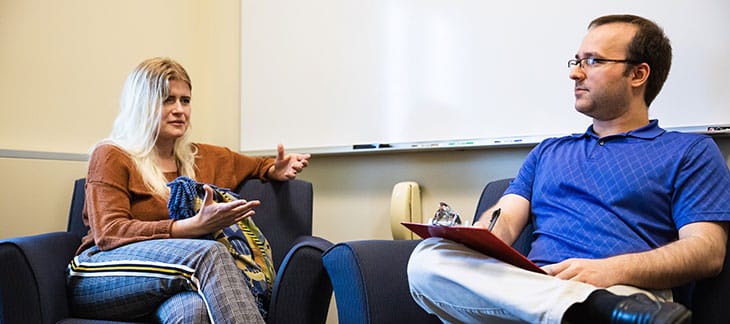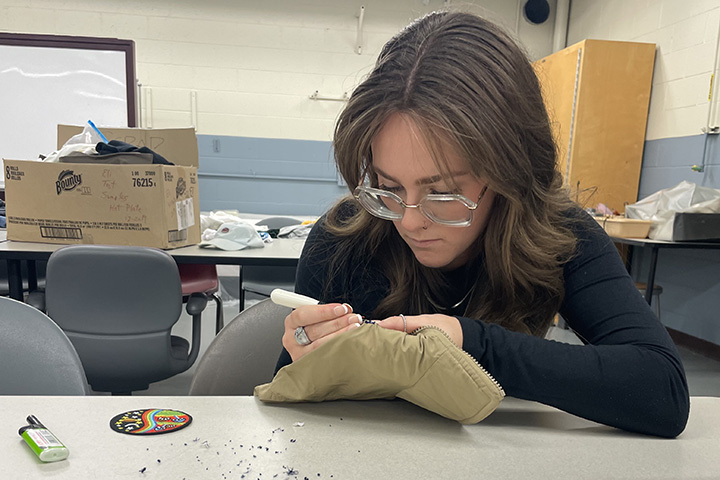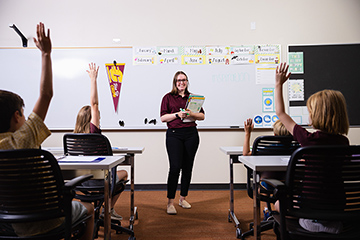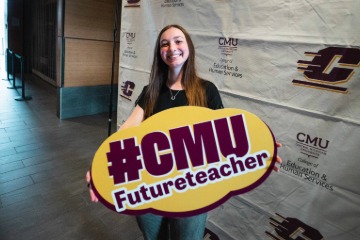Counseling for mutual benefit
Free service helps clients in need and students working toward counseling degrees
When two people talk things out, often it's good for both.
That's especially apt when describing Central Michigan University's Center for Community Counseling and Development, where people seeking counseling find the help they need, and CMU graduate students gain part of the experience required to become professional counselors.

"The students need to have clients," said counseling and special education faculty member Dr. Jennifer Werries. As part of their degree requirement, counseling students need 40 direct hours with clients during their practicum, or practical study, then 120 hours during each internship. By graduation, they'll have 700 hours of supervised clinical experience.
Ben Smith, on his way to graduating in December with a Master of Arts degree in counseling, clinical mental health track, did his practicum at the CCCD and is now an intern there. He saw about six clients a week in his practicum semester and has seen eight to 15 a week as an intern. It's a world beyond his classroom experience.
"It really helped, because beforehand you'd get a little bit of practice here and there with role-plays and observation, but here you work with real clients," he said. "We're continuously improving the program to better prepare anyone who's coming into it for the real world."
No charge for clients
Those clients — counseled free of charge — often are CMU students, faculty and staff, although the clinic also serves the larger regional community.
Clients find the center through flyers, the court system, word-of-mouth, schools and other agencies. The CCCD also coordinates with CMU's Counseling Center, handling referrals and follow-ups.
"Coming to the CCCD allowed me to self-reflect and grow in an open and comfortable environment," said a client who struggled with self-esteem and stress. "Since my first visit, I've learned tools to manage stress, build my confidence and practice self-care.
"I have a new, positive mindset since getting help, and I feel as if I am a better version of myself. This is a resource that I believe could benefit anyone at CMU."
Clients seek counseling for a full range of reasons: anxiety over studies, relationship troubles, depression, suicidal thoughts, trauma, addictions, court-ordered sessions and more.
"I think I've been able to be someone they could confide in," Smith said. "A lot of the clients coming in don't have anyone they can share these things with."
On a path to growth
Werries, who also has a private practice, became CCCD director in fall 2018 and is overseeing its growth.
The center, supported by the counseling department and College of Education and Human Services, saw 55 clients in the fall and more than 60 this semester. Up to 15 students worked as counselors this year, and Werries expects to have seven in the summer and 12-18 working in the fall. The center expanded hours from previous years, and Werries said clinical and scheduling software has facilitated the growth and depth of training.
Located in Room 322 of the Education and Human Services Building, it has a reception room; eight rooms set up for individual counseling; and two for family, children and couples counseling. Faculty can monitor sessions through an observation system that for confidentiality purposes is not connected to the web. The sessions comply with patient and student privacy laws.
The professional setting ties in with the counseling and special education department's accreditation track with the Council for Accreditation of Counseling and Related Educational Programs.
The department submitted a self-study and hopes to host a site visit in the fall and receive accreditation in 2020.
"The faculty have worked very hard to acquire this for their students," Werries said. "The process has involved about five years of curriculum revisions and committee work, but it's worth the effort.
"It's a stamp of approval to have a CACREP-accredited degree, essential for licensure, and an assurance to clients that a standard has been met."
For more information
To find out more about the Center for Community Counseling and Development, including services provided and clinic hours, call (989) 774-3532 or go to the clinic's website.




